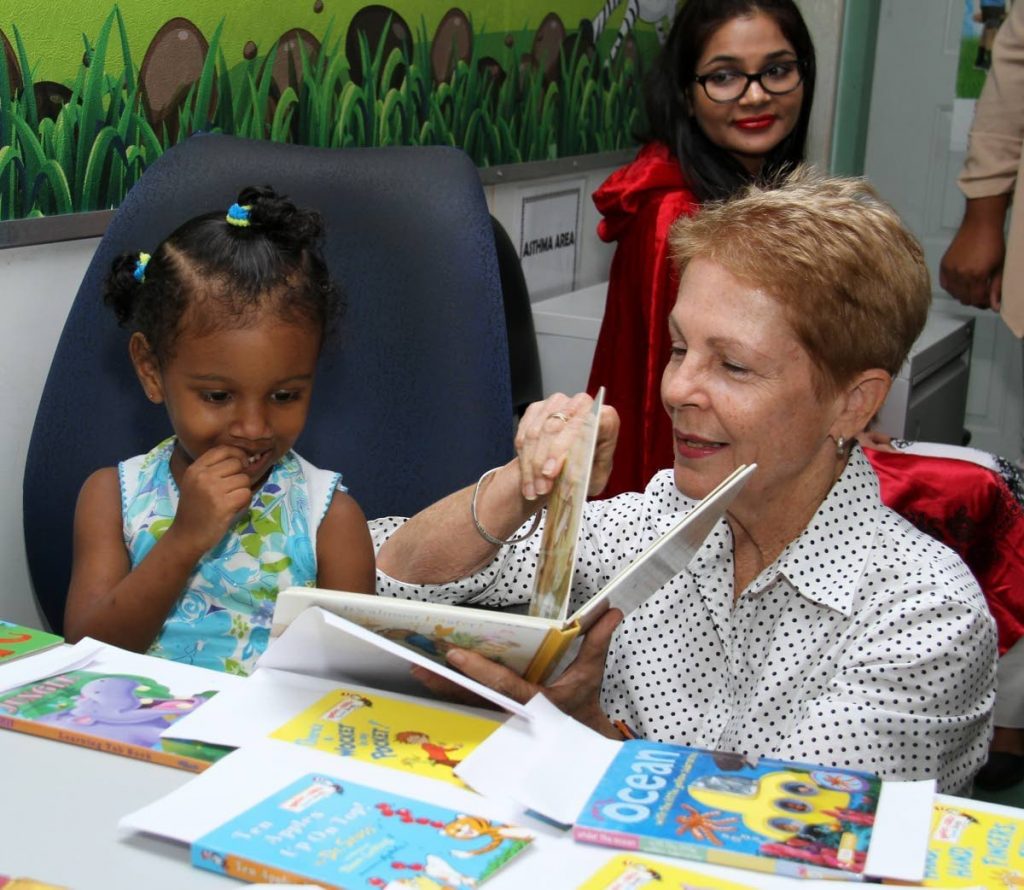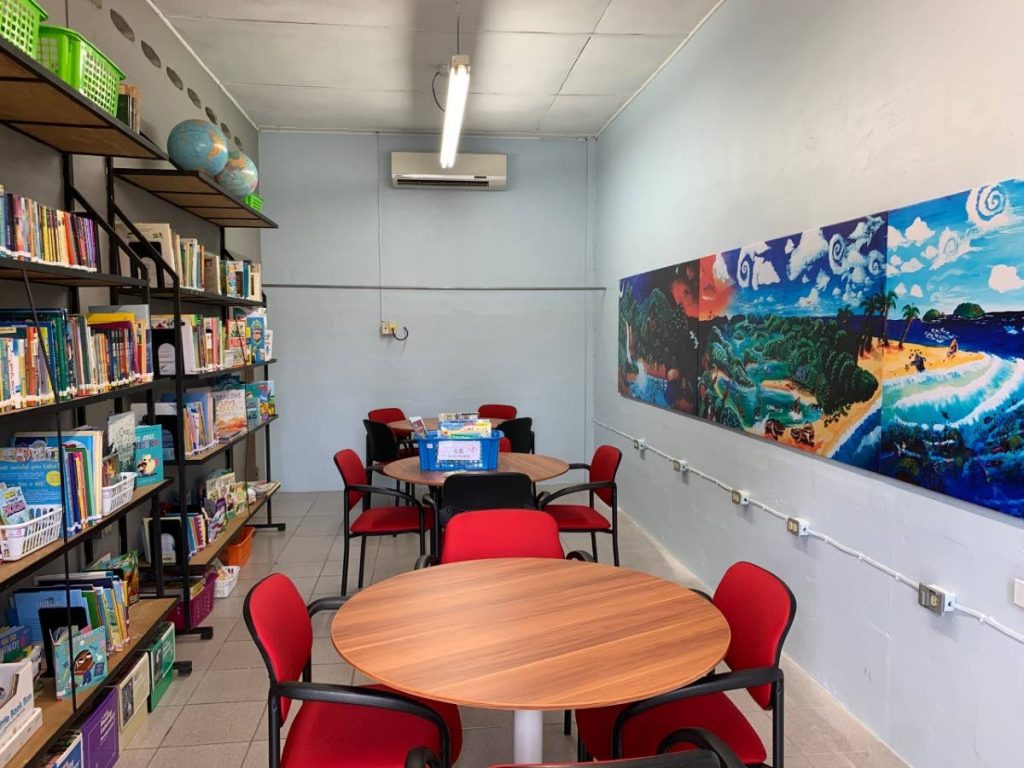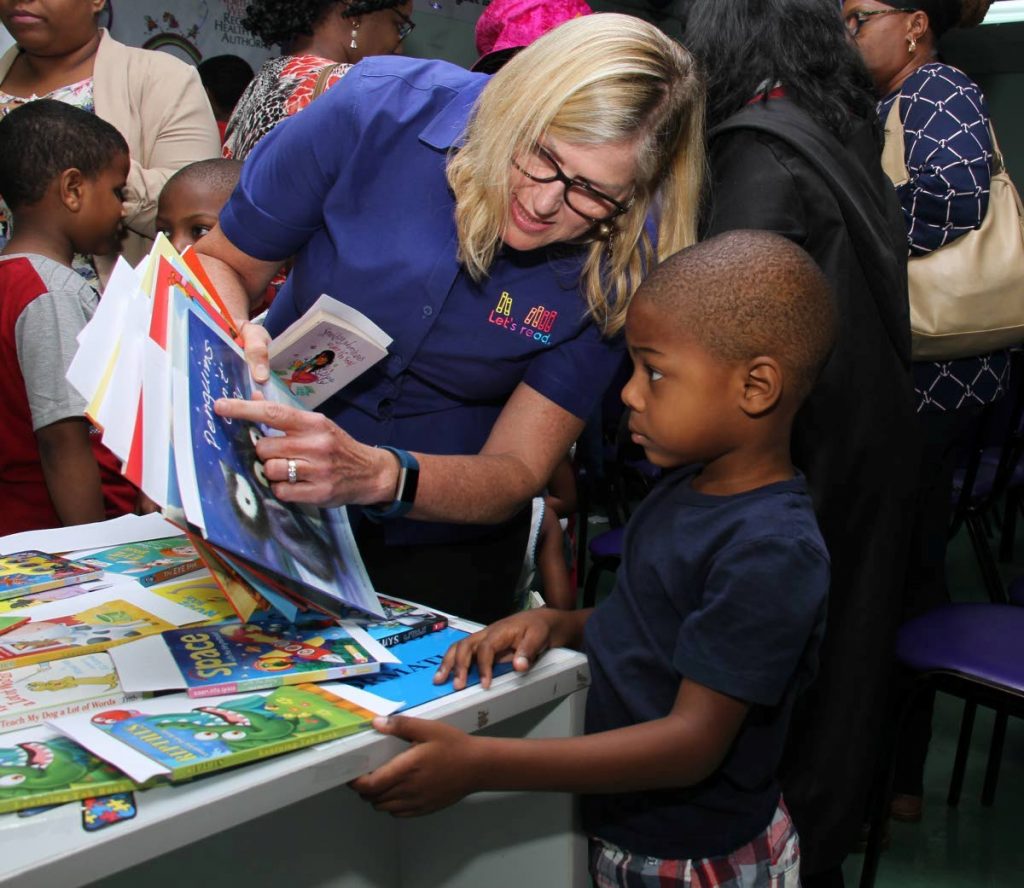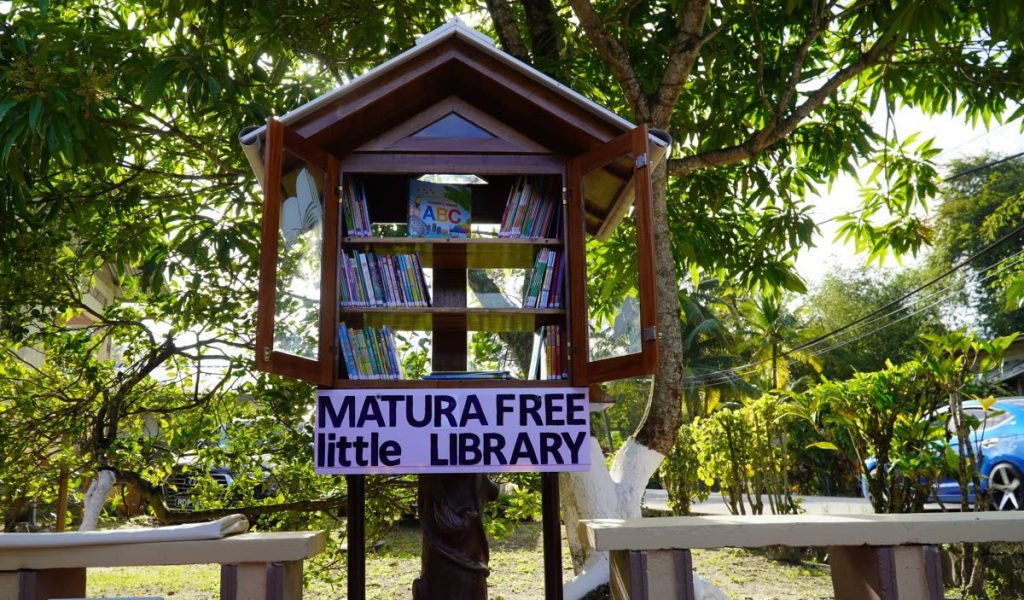Let’s Read: NGO sets up libraries in outreach to children

Ask Suzette Cadiz, co-founder of the NGO Let’s Read, about the key to education and she will tell you: “pleasure reading.”
Decades of academic studies about reading back up her claims. Research shows that children who engage in pleasure reading excel academically.
Yet most primary schools in TT have no libraries. Reading is not encouraged in schools, and many elementary teachers say they have no time to read to children. If teachers do read, it is seen as something to do in “free time” rather than an integral part of the school day.
That is where Let’s Read steps into the picture.
“Libraries should be the heart of our schools,” said Cadiz. “Our educators do not understand reading in and of itself is a learning activity. Reading for pleasure should be built into a school day.”
Let’s Read became an official NGO in 2017, but Cadiz a co-founder and director, along with Allison de la Bastide and Marcia Steinburg, had been on a reading crusade since 2010, when they developed libraries for two primary schools in Central Trinidad. All three had careers in early childhood and elementary education.
“We went to the schools and discovered their libraries were nonfunctional and almost nonexistent in elementary schools,” said Cadiz. “We got the libraries functioning. We had no money. In the beginning, we got donations of gently used books.”
The trio of educators created library spaces and put books in them. Then they gave life to those libraries.
“We read to children. We expected those reading sessions to be great, but we didn’t expect it to be so amazing,” said Cadiz.
After they had helped their first two school libraries, the school supervisor in Central asked Cadiz and de la Bastide to speak to schools that fell under academic watch for low student performance.

Soon, they went from working with two schools to working with 12.
“All of our work in libraries was by word of mouth,” said Cadiz.
The word got around.
“To date, we have re-established 31 elementary school libraries. We do a workshop with the teachers because there are no librarians in elementary schools. We model a library session and start with a read-aloud. We show children and teachers how to find books.”
Let’s Read holds teacher workshops that stress the need for libraries and independent reading in schools.
“Unfortunately our system does not have any time built in the schedule for this,” said Cadiz.
Why is it necessary?
“When children read books because they want to read, their imagination and creativity are stimulated. They explore the world and their feelings, meet people like themselves or who are very different, travel to different countries or different periods in history. Reading can relieve stress – especially in this pandemic year.”
Cadiz pointed out that reading is the foundation for all learning and children only get better at reading if they practise.
“When children read for pleasure they spontaneously acquire reading skills, build fluency, improve their vocabulary and master all the literacy skills educators want them to have. They develop longer attention spans and empathy. They become more socially aware.
“Who could argue reading wouldn’t help create responsible, empathetic, constructive citizens? Who could argue reading wouldn’t raise literacy and SEA scores?

“Children can’t afford not to read; yet listening to books being read aloud and having independent reading time in our schools is often relegated to Friday afternoons, or when all the ‘work’ is done.”
Let’s Read refused to let the closure of schools in the pandemic slow down its efforts. This month alone it offered Zoom reading sessions to six schools. They found the same excitement among children as when they visited schools in pre-pandemic days.
Here's Cadiz in a recorded reading session.
“When we were in schools, the children couldn’t wait for their library sessions. I never once had a problem with any children. I find if you just to talk to children calmly and in a respectful way and then start to read, it’s like magic. They listen.”
Cadiz notes that building listening skills is another important aspect of reading aloud to students.
Let’s Read libraries are filled with books that capture children’s imagination and reflect their world.
“We support local authors and buy their books for our libraries,” she said. But the NGO imports a lot of books because it can’t find enough engaging picture books to buy here.
“We import the latest picture books to get the diverse, amazing stories our children deserve. There are books about climate change, endangered animals and different types of families. Children see and understand themselves, pandemics, refugees – every topic you can imagine. These books help our children to understand the world. The stories give them hope, passion a little magic and a little distraction.”
Let’s Read carries its book crusade outside of school as well, giving books to students who can’t afford to buy them.
“In 2020, with the help of generous donors, we were able to get books into the hands of 1,500 children in three educational districts. We plan to increase that number this year.”
This year Let’s Read also started its first Little Free Library programme in Matura to serve about 100 children. Little Free Libraries, an international NGO, promotes community book exchange, with books put on a public bookshelf.

“The idea is to get books in the hands of communities that are far from bookstores and libraries. These are community-inspired projects. They contact us, build the public bookshelf, and we stock the libraries. We plan to work with ten more communities to build and stock Little Free libraries,” Cadiz explained.
Then there’s the Book a Baby programme, with programme co-ordinator Stacey Merry, which sensitises mothers with newborns to the importance of reading to their children. That programme started with one paediatrician in Port of Spain and spread to the child assessment unit in Barataria and the teaching hospital in San Fernando.
“Paediatricians talk to the mothers on their first visit about brain development in children who are read to and mothers are given a book to take home.”
Let’s Read also wants to work more closely with early childhood centres.
“Reading to children at this pre-school age is so important,” said Cadiz.
But again, it is hardly done.
When schools re-open, Cadiz says Let’s Read will be busier than ever. They have volunteers who have signed up to read in schools, more libraries to build and stock, more mothers with newborns to read to, and more books to get into students’ hands to take home. They will continue to advocate for dedicated teacher-librarians in primary schools.
“We would like to get a teacher-librarian programme going. It’s the only way for our primary school libraries to be completely functional.”
Cadiz keeps hoping that everyone will recognise how reading is the key to education.
“Children are not being educated. In school, they are taught to answer questions. Children are only learning what they are tested on.
“If children read good books, they learn values, morals and all the academic skills we are trying to teach.” With July just around the corner, Let’s Read points out the importance of reading over the next two months. Decades of academic research show that children who read in that long holiday return to school in September at least three months ahead of their non-reading peers.
“Providing access to books over the summer has the potential to improve reading scores. It can equalise the literacy and address the learning gap if we can get books into the hands of the underserved.”
Sometimes Cadiz wonders about the struggle to have teachers and parents recognise the importance of pleasure reading.
“I think, ‘Why am I doing this?’ And then I go to a school and read, and come home on a high. It’s like magic.”
You can contact Let’s Read for more information and to support the NGO. E-mail letsreadtt@gmail, check the website at letsreadtt.org or the Facebook page at letsreadtt.


Comments
"Let’s Read: NGO sets up libraries in outreach to children"